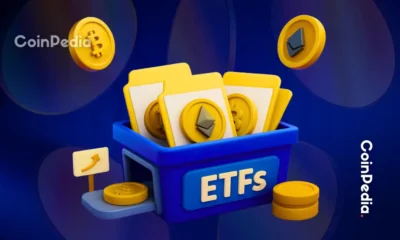Policy & Regulation
A No-BS Legal Guide for Bitcoin and Crypto Builders
Credit : cryptonews.net
Kenya has handed a Digital Asset Service Suppliers (VASP) regulation that essentially reshapes the regulatory panorama for digital belongings within the nation.
In plain English: it doesn’t regulate Bitcoin the protocol or your personal self-custody. As a substitute, it regulates corporations that contact buyer belongings — exchanges, custodians, token issuers, funding advisors, brokers, and buying and selling platforms.
The regulation creates a licensing perimeter round business intermediaries and provides regulators enforcement enamel over that perimeter. Consider it as drawing a regulatory fence round companies that deal with different individuals’s bitcoin and crypto, while leaving particular person customers and peer-to-peer (P2P) transactions exterior the gate.
This distinction is vital: the Act targets digital asset providers, not the underlying know-how or personal possession. Should you’re holding your personal keys and transacting immediately with one other particular person, you’re exterior the licensing regime. However the second you begin providing custody, brokerage, advisory, or platform providers to the general public, you’re contained in the perimeter — and also you want a license.
Key takeaway: The VASP Act considerations business intermediaries, not particular person customers. Self-custody and P2P transactions stay unregulated, however companies touching buyer belongings face full licensing necessities.
What Components of “Crypto” the Regulation Does Regulate: The Licensing Perimeter
Licensed VASPs are any Kenya-registered (or compliant overseas) corporations that carry out the actions listed within the Schedule to the Act. These actions map to particular regulators — primarily the Central Financial institution of Kenya (CBK) and the Capital Markets Authority (CMA) — and set off complete compliance obligations.
Exchanges & Buying and selling Platforms: Brokers, buying and selling platforms, and providers facilitating fiat-to-VA or VA-to-VA exchanges. Each centralized and sure decentralized platforms that maintain custody or market-make in opposition to shoppers fall inside scope.
Custody & Pockets Suppliers: Any service holding consumer cash on their behalf. Should you management the keys to buyer belongings, you’re a custodian and want licensing, capital adequacy, segregation, and audit necessities.
Funding Advisors & Managers: Offering recommendation or discretionary administration of digital asset portfolios for shoppers. This captures each retail advisory and institutional asset administration providers.
Token Issuance & Tokenization: Preliminary digital asset choices (ICOs/STOs) and real-world asset (RWA) tokenization. These fall primarily underneath CMA oversight as they intersect with securities and capital-markets regulation.
Escrow & Platform Operators: Providers offering escrow capabilities for digital asset transactions and sure platform operators facilitating multi-party trades or settlements.
Every exercise triggers particular obligations: licenses, capital and solvency necessities, fit-and-proper assessments, AML/CFT/CPF controls, conduct requirements, cybersecurity measures, promoting guidelines, periodic audits, and ongoing reporting. The breadth is deliberate — regulators need bank-grade compliance from anybody touching buyer belongings.
Key Definitions for Phrases within the Act
Digital asset: A digital illustration of worth that may be traded, transferred, or used for fee or funding functions. Explicitly excludes fiat foreign money, e-money, and securities (which have their very own regulatory regimes).
Digital Asset Buying and selling Platform: A centralized or decentralized platform that facilitates trade and both (i) holds custody of consumer belongings, or (ii) market-makes in opposition to shoppers. Each limbs set off licensing.
Digital Service Token: Pure utility tokens which are non-transferable and used solely inside a closed ecosystem. These fall exterior the licensing perimeter — a slim carve-out for real utility.
These definitions matter as a result of they set the boundaries of regulatory jurisdiction. The Act makes use of practical language (“digital illustration of worth”) moderately than technology-specific phrases, which means it’s designed to be technology-neutral and seize future improvements. Nevertheless, this breadth additionally creates interpretive gray areas — count on subsidiary rules and steerage to make clear edge circumstances.
Who’s in Cost? Twin Regulators and Subsidiary Powers
Central Financial institution of Kenya (CBK) + Capital Markets Authority (CMA)
These are the joint lead regulators for VASPs, with activity-based allocation. CBK usually oversees funds, custody, and trade capabilities; CMA handles token choices, funding recommendation, and tokenized securities. The Cupboard Secretary for Nationwide Treasury can designate further regulators by Gazette discover — so look ahead to future expansions of the regulatory perimeter.
Subsidiary Rules (The Actual Energy)
The Treasury CS has broad discretion to problem subsidiary rules that flesh out vital particulars: stablecoin frameworks, tokenization requirements, capital adequacy ratios, solvency assessments, insurance coverage necessities, conduct guidelines, promoting requirements, cybersecurity mandates, and extra.
Count on a variety of the precise coverage to be determined right here — the Act is a framework; the regs would be the enamel.
Sensible implication: The act is intentionally high-level. Founders and compliance groups ought to observe the gazetting of subsidiary rules intently — these will decide capital thresholds, operational requirements, and day-to-day compliance burdens. Early engagement with regulators throughout session durations is advisable when you’re planning a VASP enterprise.
What the Regulation Doesn’t Regulate
Outdoors the licensed perimeter, the Act doesn’t (on its face) outlaw or require licensing for:
- Proudly owning Bitcoin in self-custody (your personal keys, your personal pockets) — that is personal property, not a regulated service.
- Paying one other particular person immediately wallet-to-wallet (peer-to-peer) — personal contractual settlement between two events stays exterior the scope.
- Operating a non-custodial pockets app the place customers maintain their very own keys and also you present solely software program (absent different regulated actions like brokerage or custody).
The Act explicitly applies to “digital asset providers” (the Schedule checklist) provided in Kenya; it isn’t a normal ban or license requirement on personal use of bitcoin or different digital belongings.
That mentioned, unlicensed companies providing any Schedule exercise can face enforcement, fines, and legal penalties. The road between “personal use” and “carrying on a enterprise” will likely be examined in observe — habitually dealing for the general public, even informally, might morph you into an unlicensed dealer.
Execs & Cons (Gloves Off)
Potential Execs
Authorized Readability for Establishments: Pensions, banks, fintechs, and corporates now have a rulebook to have interaction with digital belongings. Licensed on-ramps and custodians with correct compliance make institutional adoption possible.
Client Safeguards: Match-and-proper assessments, capital adequacy, audits, asset segregation, cybersecurity requirements, and conduct guidelines scale back “cowboy operator” threat. Retail customers profit from recourse mechanisms and dispute decision.
Tax Clear-Up: The punitive 3% Digital Asset Tax on transaction worth was repealed by Finance Act 2025. Kenya now pivots to excise obligation on VASP charges — a lot friendlier for savers and long-term holders. Tax targets platforms’ costs, not the total notional commerce worth.
Pathway for Tokenization & RWAs: Clear CMA oversight for tokenized securities and real-world belongings unlocks capital-markets pilots and enterprise use circumstances (land registries, commerce finance, supply-chain tokenization).
Actual Cons
Gatekeeping through Licenses: Twin regulators plus excessive capital, insurance coverage, and AML burdens can lock out SMEs and open-source groups. Huge banks and fintechs win by default; innovation could also be stifled by compliance prices.
Subsidiary-Guidelines Danger: Broad discretion given to the Treasury CS can tighten guidelines on stablecoins, self-hosted pockets interfaces, P2P marketplaces, or Lightning gateways later. Coverage can “slim the pipe” after headlines fade and public consideration wanes.
Surveillance Creep: Strict know-your-customer (KYC) legal guidelines and record-keeping throughout VASPs, plus obligatory>From a Bitcoin Lens: Buying, Saving & Spending

Bitcoin is handled in another way than different digital belongings in Kenya’s new VASP invoice.
Buying BTC
Through VASPs (exchanges/brokers): Count on full KYC, fee-based excise obligation, AML transaction monitoring, withdrawal insurance policies, and proof-of-funds queries. Institutional-grade on-ramps ought to enhance in high quality and reliability — however at the price of privateness and friction.
Peer-to-peer: Non-public purchases and gross sales between people stay exterior the licensing perimeter, so long as you’re not carrying on a Schedule enterprise. Watch out to not morph into an unlicensed dealer or trade by habitually dealing for the general public (e.g., operating a Telegram group providing common purchase/promote providers).
Sensible upshot: Retail customers can nonetheless dollar-cost-average non-custodially through P2P or occasional licensed platform buys; companies wanting routinized, high-volume flows will seemingly use licensed platforms to handle compliance and audit trails.
Saving in BTC (Self-Custody)
Conserving Bitcoin by yourself pockets ({hardware} or software program the place you management the keys) is not prohibited by the Act. That is personal property, akin to holding gold or overseas foreign money at house.
Company treasuries: Corporations can maintain BTC on stability sheet, however should comply with IFRS accounting requirements (normally labeled as intangible asset at value with impairment testing; or stock when you’re a market-maker). Create a board-approved treasury coverage masking allocation limits, custody preparations, key administration, and audit trails. Kenya applies IFRS; the IFRS Interpretations Committee 2019 steerage (IAS 38 therapy) is the standard reference.
Spending / Paying in BTC
Direct wallet-to-wallet funds between two events (e.g., paying a provider, settling an bill, tipping a creator) usually are not regulated as a VASP exercise. Freedom of contract applies; the state can tax earnings or positive aspects, however doesn’t pre-approve the medium of settlement.
Should you present a fee service that sits within the movement of buyer funds — custody, routing, conversion, settlement facilitation — you’re seemingly a VASP-type enterprise and want licensing. Lightning gateways that take custody or present fiat conversion will fall inside scope; pure routing nodes operated by customers themselves seemingly gained’t.
Structure, Tax & Firm Compliance — Outdoors the VASP Fence
Constitutional Stakes
Property & Privateness: Self-custodied keys are a type of digital property and private information. Any future subsidiary regulation that compels key disclosure or bulk monitoring should go constitutional assessments underneath Kenya’s 2010 Structure: necessity, proportionality, and respect for elementary rights (Articles 31, 40). The VASP Act doesn’t override these rights — it creates a licensing regime for intermediaries, not a surveillance constitution for personal wallets.
Freedom of Contract & Affiliation: Two individuals agreeing to settle an obligation in Bitcoin train freedom of contract (Article 36). The state can tax the earnings or positive aspects, however needn’t pre-approve the medium as long as no different regulation (e.g., money-laundering statutes) is violated. The VASP Act doesn’t prohibit personal contractual settlement in digital belongings.
Tax (Submit-Finance Act 2025)
No Extra 3% DAT
The punitive Digital Asset Tax on transaction worth is repealed. As a substitute, Kenya now levies excise obligation on VASP charges (the platform’s cost for service). This doesn’t tax peer-to-peer notional flows immediately; it taxes the middleman’s fee.
Earnings / Capital Positive aspects
People: Kenya taxes earnings; positive aspects could also be taxable when you’re buying and selling as a enterprise or obtain BTC for providers rendered. Passive long-term appreciation and not using a realization occasion isn’t usually taxed till disposal — however doc your value foundation (date acquired, value in Kenyan shillings (KES), transaction ID (txid)).
Corporations: Realized positive aspects/losses hit revenue & loss underneath IFRS; taxable underneath company earnings tax when realized. If BTC is held as stock (e.g., market-making), buying and selling income are unusual earnings. If held as intangible asset, impairment losses are deductible however unrealized appreciation isn’t taxed till sale.
VAT
Typically no VAT on cash or money-like devices; however VASPs’ service charges can appeal to VAT or excise relying on classification. Affirm together with your tax advisor as soon as subsidiary rules land. Excise on VASP charges is already indicated in Finance Act 2025.
Accounting & Audit (IFRS)
Classification: Most company treasuries deal with Bitcoin as an intangible asset (IAS 38). Market-makers and merchants might classify as stock (IAS 2).
Measurement: Intangibles are usually carried at value much less impairment (no upward revaluation by means of P&L till disposal), which may considerably understate financial worth on the stability sheet. Pair this with administration metrics in notes: BTC items held, fair-value footnotes, value-at-risk (VaR) disclosures.
Controls: Twin-control of personal keys, SOC-audited custody suppliers (if utilizing exterior custody), board-approved treasury insurance policies, segregation between treasury holdings vs operational float, and common reconciliation of on-chain balances.
Firm Regulation & Basic Compliance
Should you supply any Schedule VASP exercise (brokerage, custody, platform, recommendation, token issuance), you should: incorporate appropriately, apply to the related regulator(s), meet capital and solvency necessities, go fit-and-proper assessments, implement AML/KYC/CFT controls, adjust to cybersecurity and conduct requirements, adhere to promoting guidelines, file periodic stories, and endure audits.
Should you solely maintain BTC in your stability sheet, pay suppliers in BTC by mutual settlement, or settle for BTC as settlement (transformed instantly or held) with out appearing as a custodian or trade for the general public, you’re not a VASP — commonplace Corporations Act and tax guidelines apply, however no VASP license is required.
Actionable Playbooks: What You Ought to Do Now
For Peculiar Kenyans
Study self-custody: Select a good non-custodial pockets ({hardware} or cellular), again up your seed phrase correctly (offline, a number of safe areas), and observe small sends to familiarize your self with the method.
DCA with exits: Use licensed on-ramps for KES-to-BTC conversions when handy, however instantly withdraw to your personal pockets. Preserve detailed information: date, KES value foundation, txid, and pockets deal with.
Peer-to-peer funds: You’ll be able to pay or obtain BTC immediately wallet-to-wallet. If it’s earnings (e.g., freelance work), declare it for tax. Should you get rid of BTC at a acquire, observe your value foundation to calculate taxable acquire precisely.
For SMEs / Corporates
Board-approved BTC Treasury Coverage: Doc allocation limits (e.g., % of reserves), threat administration (volatility, custody, counterparty), key administration procedures (multi-sig, {hardware} safety modules), and accounting therapy (IFRS classification, impairment testing).
Non-custodial acceptance: Settle for BTC from clients immediately into your personal pockets, or through a fee processor that settles immediately to you in BTC or KES (minimising custodial publicity and regulatory threat).
Keep away from “unintended VASP” threat: Don’t maintain consumer BTC, don’t dealer or trade for the
public, don’t run a buying and selling platform—except you affirmatively intend to acquire a VASP license and bear the compliance prices.
Tax & audit prepared: Preserve ledgers of BTC items held, undertake a constant cost-basis technique (FIFO, LIFO, or particular identification), and report KES functional-currency conversions at transaction dates for P&L and tax functions.
For Builders & Founders
Resolve your regulatory posture: Non-custodial software program (safer, exterior licensing perimeter) vs custodial/market-facing VASP (licensing roadmap, capital necessities, ongoing audits, and compliance overhead).
Design for self-custody first: Prioritize consumer management of keys, composability with Lightning and different open protocols, and clear information trails customers can export for tax reporting and auditability.
Interact regulators early: If pursuing a VASP license, start dialogue with CBK/CMA in the course of the software drafting section. Perceive their expectations on capital, techniques, AML controls, and governance earlier than you’re too far down the construct path.
Keep agile on subsidiary regs: Monitor Gazette notices and public consultations — subsidiary rules will outline day-to-day compliance burdens, stablecoin guidelines, and rising areas like Lightning or DeFi interfaces.
Backside Line: What This Actually Means
This regulation licenses intermediaries; it doesn’t outlaw Bitcoin self-custody or peer-to-peer use.
The VASP Act will make bank-grade, compliant on-ramps extra obtainable — institutional capital can now movement into licensed custodians and exchanges with regulatory certainty. That’s a win for legitimacy, client safety, and formalizing the business.
However it additionally centralizes energy in licensed platforms, with all the standard trade-offs: greater charges, obligatory KYC, monetary surveillance, slower iteration on account of compliance overhead, and a bias in the direction of incumbents (banks, massive fintechs) who can afford the capital and authorized prices. Smaller, open-source groups and peer-to-peer marketplaces face an uphill battle.
For Residents & SMEs
The successful technique is straightforward: study self-custody, doc your flows meticulously (dates, quantities,value foundation, txids), and don’t change into a VASP by chance. Preserve your Bitcoin by yourself keys, transact peer-to-peer the place doable, and use licensed platforms solely when obligatory for fiat conversion or institutional compliance.
For Builders Selecting the VASP Route
Assume bank-like compliance from day one: capital adequacy, fit-and-proper administrators, AML/KYC techniques (transaction monitoring, sanctions screening, suspicious-activity reporting), cybersecurity frameworks (ISO 27001, penetration testing), segregated consumer belongings, exterior audits, and ongoing regulatory reporting. Price range for authorized and compliance personnel; this isn’t a lean startup play.
The VASP Act is a double-edged sword: it legitimizes the business and invitations institutional participation, but it surely additionally imposes gatekeeping and surveillance that may undermine the open, permissionless ethos of Bitcoin. Your transfer will depend on your targets — freedom and sovereignty, or legitimacy and institutional entry.
Sources & Additional Studying
Official Invoice Textual content
Digital Asset Service Suppliers Act (Kenya): Definitions (Half II), scope of software (Half III), Schedule of regulated actions, regulator mapping (CBK/CMA allocation), licensing framework, capital and solvency necessities, fit-and-proper requirements, AML/CFT/CPF obligations, conduct and promoting guidelines, and enforcement provisions.
Finance Act 2025 (Tax Adjustments)
Repeal of the three% Digital Asset Tax on transaction worth; introduction of excise obligation on VASP service charges. Confirms shift from taxing notional commerce worth to taxing middleman costs — a lot friendlier for long-term holders and peer-to-peer customers.
Passage & Twin-Regulator Design
Reuters, Parliament of Kenya official information, and press protection of the Invoice’s passage and pending/reported presidential assent. Commentary on the CBK/CMA co-ordination mechanism and the Cupboard Secretary’s subsidiary regulation powers.
IFRS Accounting Steering
IFRS Interpretations Committee (2019) steerage on holdings of cryptocurrencies: IAS 38 (intangible belongings) therapy, cost-less-impairment mannequin, disclosure necessities. Kenya applies IFRS for company monetary reporting; that is the authoritative reference for balance-sheet classification of Bitcoin and different digital belongings.
Constitutional Framework
Structure of Kenya 2010: Articles 31 (privateness), 36 (freedom of affiliation), 40 (property rights), and 47 (truthful administrative motion). These provisions anchor particular person rights in opposition to over-reach in subsidiary rules (e.g., compelled key disclosure, bulk surveillance with out judicial oversight).
This information is for informational functions and doesn’t represent authorized, tax, or monetary recommendation. Seek the advice of a professional Kenyan lawyer, tax advisor, or accountant on your particular circumstances. Regulation and rules evolve; confirm present standing earlier than appearing.
This put up Kenya’s New VASP Regulation: A No-BS Authorized Information for Bitcoin and Crypto Builders first appeared on Bitcoin Journal and is written by Robert Kirubi.
-

 Meme Coin7 months ago
Meme Coin7 months agoDOGE Sees Massive User Growth: Active Addresses Up 400%
-

 Blockchain1 year ago
Blockchain1 year agoOrbler Partners with Meta Lion to Accelerate Web3 Growth
-

 Videos1 year ago
Videos1 year agoShocking Truth About TRON! TRX Crypto Review & Price Predictions!
-

 NFT10 months ago
NFT10 months agoSEND Arcade launches NFT entry pass for Squad Game Season 2, inspired by Squid Game
-

 Meme Coin1 year ago
Meme Coin1 year agoCrypto Whale Buys the Dip: Accumulates PEPE and ETH
-

 Solana4 months ago
Solana4 months agoSolana Price to Target $200 Amid Bullish Momentum and Staking ETF News?
-

 Ethereum1 year ago
Ethereum1 year ago5 signs that the crypto bull run is coming this September
-

 Gaming1 year ago
Gaming1 year agoGameFi Trends in 2024



































